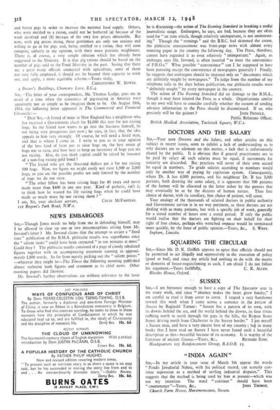NEWS EMBARGOES
Sta,—Though Janus needs no help from me in defending himself, may I be allowed to clear up one or two misconceptions arising from Mr. Inwood's letter ? Mr. Inwood ciaims that the attempt to secure a " fixed time" publication of the B.M.A. plebiscite results was superfluous since the " salient items " could have been extracted " in ten minutes at most." Could they ? The plebiscite results consisted of a page of closely tabulated figures together with an accompanying statement running to approxi- mately 1,800 words. So far from merely picking out the "salient points" —whatever they might be—The Times the followingmorning published almost verbatim both figures and statement as its chief news. Other morning papers did likewise.
Mr. Inwood's further observations are without relevance to the issue
he is discussing—the action of The Evening Standard in breaking a useful journalistic usage. Embargoes, he says, are bad, because they are often used for " an item which, though relatively unimportant, is not uninterest- ing." Though the " evenings " and the B.B.C. had skimmed the cream, the plebiscite announcement was front-page news with almost every morning paper in the country the following day. The Press, therefore, cannot haVe regarded it as even relatively " unimportant." Again, an embargo, says Mr. Inwood, is often inserted " to meet the convenience of P.R.O.s." What possible "convenience" can I be supposed to have been pursuing except the convenience of newspapers generally ? Finally, he suggests that embargoes should be imposed only on " documents which are definitely sought by newspapers." To judge from the number of my telephone calls in the days before publication, our plebiscite results were " definitely sought " by every newspaper in the country.
The action of The Evening Standard did no damage to the B.M.A., though it may have injured the Press as a whole. Organisations similar to my own will have to consider carefully whether the custom of sending advance information to the Press should be discontinued. If so, who
Public Relations Officer.
British Medical Association, Tavistock Square, W.C.i.


































 Previous page
Previous page